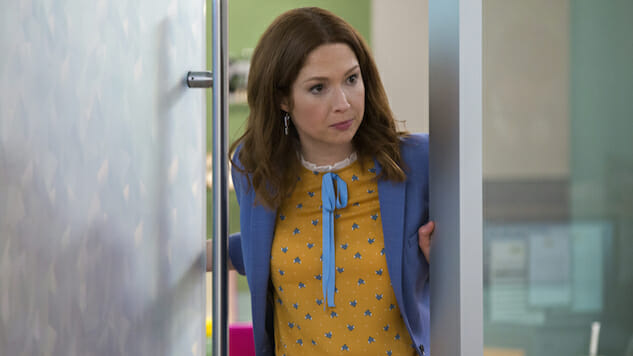Kimmy Schmidt‘s Long Goodbye
Photo: Eric Liebowitz/Netflix
The bifurcated fourth season of Unbreakable Kimmy Schmidt begins with an homage to The Mary Tyler Moore Show, as Kimmy (Ellie Kemper)—still getting her feet wet at a parodic tech giant called Giztoob—tosses her cap straight into a tree. Compared to Mary Richards’ earnest celebration of her new life in Minneapolis, it’s a playful goof on a traditional sitcom’s title sequence, which Unbreakable Kimmy Schmidt already auto-tuned to earworm perfection (“They alive, damnit!”) when it debuted in 2015. At the same time, though, it’s a rather forlorn signal that Robert Carlock and Tina Fey’s once-brilliant confection, which I described at the time as a “bright, zippy, absolutely hilarious depiction of loneliness, human frailty, and abject failure,” has lost sight of what it is, or was. “Little girl, big city!” Kemper’s co-star, Jane Krakowski, sings on both ends of the new season’s first half. “This is the show now.”
TV series evolve over time, of course, and Kimmy—one of four women held captive in an underground bunker by wedding DJ, doomsday cultist, and serial rapist Rev. Richard Wayne Gary Wayne (Jon Hamm) for 15 years—has always been a heroine ripe for transformation. Much of Kimmy’s arc, including a terrific Season Two subplot guest-starring Fey as an alcoholic therapist, has focused, and rightly so, on trauma’s long reach; from re-introducing herself to the world to confronting the “men’s rights activist” (Bobby Moynihan) justifying Wayne’s criminal history, Kimmy continues to reckon honestly, haltingly, with an almost unimaginable experience—and this on the same program responsible for the iconic musical numbers “Peeno Noir” (“an ode to black penis”) and “Daddy’s Boy” (an ode to old penis or young ass, depending on your point of view). On the face of it, then, the fourth season should be a coup, bringing Kimmy’s repeated sexual assault at the hands of the reverend to bear on its brutal treatment of the real-world men already attempting to “make a comeback” months after being accused of widespread misconduct, or worse.
But it’s not.
I should stipulate here that even the Unbreakable Kimmy Schmidt I praised for its awfully funny acknowledgement that “life beats you up” had its glaring blind spots. Its promiscuous approach to issues of race and racism—wealthy society wife Jacqueline Voorhees’ (Krakowski) secret Native American heritage; aspiring actor Titus Andromedon’s (Tituss Burgess) one-man show about his past life as a geisha; a bridge-to-nowhere plot about re-naming the Washington Redskins—has been so uniformly clumsy for so long I couldn’t even muster surprise at the new season’s iffy (and fast-scuttled) examination of white privilege, set inside a Korean nail salon. (Race is the central bugbear of the Fey/Carlock fictional universe, their insurmountable Everest.) Still, for all its foibles, Unbreakable Kimmy Schmidt felt like an ambitious new frontier for its creators, applying 30 Rock’s madcap sensibilities to more forbidding subject matter, and unearthing in the process a sort of apocalyptic comedy: How do you maintain a modicum of optimism, the series asked, when your world has already fallen apart?
-

-

-

-

-

-

-

-

-

-

-

-

-

-

-

-

-

-

-

-

-

-

-

-

-

-

-

-

-

-

-

-

-

-

-

-

-

-

-

-








































